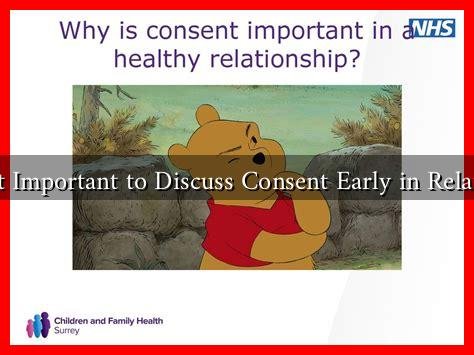-
Table of Contents
Why Is It Important to Discuss Consent Early in Relationships
In recent years, the conversation around consent has gained significant traction, particularly in the context of romantic relationships. Understanding and discussing consent early in a relationship is crucial for establishing trust, respect, and healthy boundaries. This article explores the importance of early consent discussions, the implications of neglecting this topic, and practical ways to approach the conversation.
The Foundation of Healthy Relationships
Consent is not merely a legal term; it is a fundamental aspect of any healthy relationship. It involves mutual agreement and understanding between partners regarding physical intimacy and emotional boundaries. Discussing consent early in a relationship lays the groundwork for a respectful partnership. Here are some reasons why this is essential:
- Establishes Trust: Open discussions about consent foster an environment of trust. When both partners feel comfortable expressing their boundaries, it strengthens their emotional connection.
- Promotes Communication: Early conversations about consent encourage ongoing dialogue about desires and limits, which is vital for a healthy relationship.
- Reduces Misunderstandings: Clear communication about consent helps prevent misinterpretations and assumptions, which can lead to conflict or discomfort.
The Consequences of Ignoring Consent
Neglecting to discuss consent can have serious repercussions. Research indicates that a lack of communication about consent is linked to higher rates of sexual assault and relationship dissatisfaction. According to a study published in the Journal of Interpersonal Violence, individuals who do not engage in open discussions about consent are more likely to experience negative relationship outcomes.
- Increased Risk of Miscommunication: Without clear consent, partners may misinterpret each other’s intentions, leading to unwanted advances or feelings of violation.
- Emotional Distress: Ignoring consent can result in feelings of betrayal, anxiety, and emotional trauma, which can have long-lasting effects on individuals.
- Legal Implications: In some cases, failing to obtain consent can lead to legal consequences, including charges of sexual assault.
Practical Approaches to Discussing Consent
Having a conversation about consent may feel daunting, but it is essential for fostering a healthy relationship. Here are some practical tips for discussing consent early on:
- Choose the Right Time: Find a comfortable and private setting to discuss consent, ensuring both partners feel safe and relaxed.
- Be Honest and Open: Share your thoughts and feelings about consent, and encourage your partner to do the same. Honesty is key to building trust.
- Use “I” Statements: Frame your thoughts using “I” statements to express your feelings without placing blame or pressure on your partner. For example, “I feel more comfortable when we talk about our boundaries.”
- Encourage Questions: Create an open dialogue by inviting your partner to ask questions or express concerns about consent and boundaries.
Case Studies and Statistics
Several studies highlight the importance of discussing consent in relationships. For instance, a survey conducted by the Rape, Abuse & Incest National Network (RAINN) found that 1 in 6 women and 1 in 33 men have experienced attempted or completed rape in their lifetime. These statistics underscore the critical need for clear communication about consent to prevent such incidents.
Moreover, a study published in the Journal of Adolescent Health revealed that adolescents who engage in discussions about consent are more likely to have healthier sexual relationships. This emphasizes the importance of instilling the value of consent from a young age.
Conclusion
Discussing consent early in relationships is not just a matter of legality; it is a vital component of building a healthy, respectful partnership. By establishing trust, promoting open communication, and reducing misunderstandings, couples can create a strong foundation for their relationship. Ignoring this crucial topic can lead to emotional distress, miscommunication, and even legal consequences. Therefore, it is imperative for individuals to approach the subject of consent with honesty and openness, ensuring that both partners feel safe and respected. Ultimately, prioritizing consent is a step toward fostering healthier relationships and a more respectful society.


